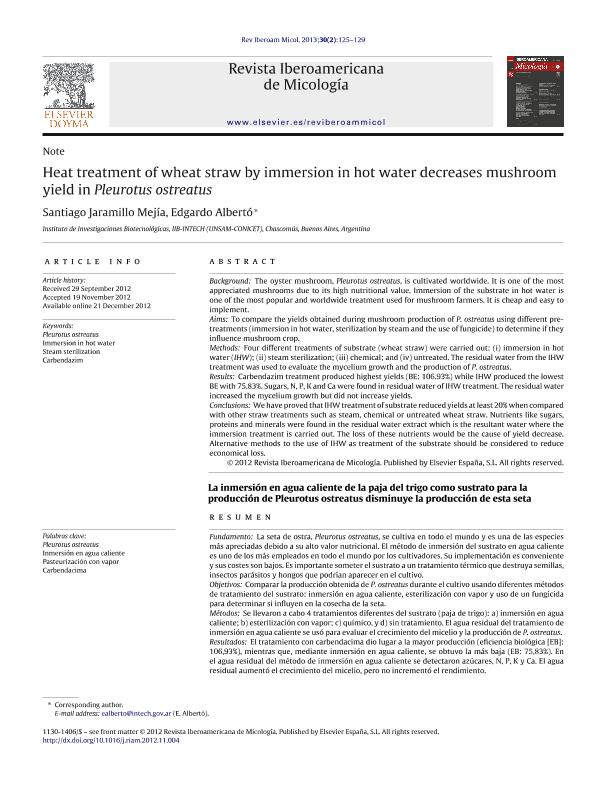Mostrar el registro sencillo del ítem
dc.contributor.author
Jaramillo Mejia, Santiago

dc.contributor.author
Alberto, Edgardo Omar

dc.date.available
2017-09-13T13:34:33Z
dc.date.issued
2013-04
dc.identifier.citation
Jaramillo Mejia, Santiago; Alberto, Edgardo Omar; Heat treatment of wheat straw by immersion in hot water decreases mushroom yield in Pleurotus ostreatus; Asociacion Espanola Micología; Revista Iberoamericana de Micologia; 30; 2; 4-2013; 125-129
dc.identifier.issn
1130-1406
dc.identifier.uri
http://hdl.handle.net/11336/24108
dc.description.abstract
Background: The oyster mushroom, Pleurotus ostreatus, is cultivated worldwide. It is one of the most appreciated mushrooms due to its high nutritional value. Immersion of the substrate in hot water is one of the most popular and worldwide treatment used for mushroom farmers. It is cheap and easy to implement. Aims: To compare the yields obtained during mushroom production of P. ostreatus using different pretreatments (immersion in hot water, sterilization by steam and the use of fungicide) to determine if they influence mushroom crop. Methods: Four different treatments of substrate (wheat straw) were carried out: (i) immersion in hot water (IHW); (ii) steam sterilization; (iii) chemical; and (iv) untreated. The residual water from the IHW treatment was used to evaluate the mycelium growth and the production of P. ostreatus. Results: Carbendazim treatment produced highest yields (BE: 106.93%) while IHW produced the lowest BE with 75.83%. Sugars, N, P, K and Ca were found in residual water of IHW treatment. The residual water increased the mycelium growth but did not increase yields. Conclusions: We have proved thatIHWtreatment of substrate reduced yields atleast 20% when compared with other straw treatments such as steam, chemical or untreated wheat straw. Nutrients like sugars, proteins and minerals were found in the residual water extract which is the resultant water where the immersion treatment is carried out. The loss of these nutrients would be the cause of yield decrease. Alternative methods to the use of IHW as treatment of the substrate should be considered to reduce economical loss.
dc.description.abstract
Fundamento: La seta de ostra, Pleurotus ostreatus, se cultiva en todo el mundo y es una de las especies más apreciadas debido a su alto valor nutricional. El método de inmersión del sustrato en agua caliente es uno de los más empleados en todo el mundo por los cultivadores. Su implementación es conveniente y sus costes son bajos. Es importante someter el sustrato a un tratamiento térmico que destruya semillas, insectos parásitos y hongos que podrían aparecer en el cultivo. Objetivos: Comparar la producción obtenida de P. ostreatus durante el cultivo usando diferentes métodos de tratamiento del sustrato: inmersión en agua caliente, esterilización con vapor y uso de un fungicida para determinar si influyen en la cosecha de la seta. Métodos: Se llevaron a cabo 4 tratamientos diferentes del sustrato (paja de trigo): a) inmersión en agua caliente; b) esterilización con vapor; c) químico, y d) sin tratamiento. El agua residual del tratamiento de inmersión en agua caliente se usó para evaluar el crecimiento del micelio y la producción de P. ostreatus. Resultados: El tratamiento con carbendacima dio lugar a la mayor producción (eficiencia biológica [EB]: 106,93%), mientras que, mediante inmersión en agua caliente, se obtuvo la más baja (EB: 75,83%). En el agua residual del método de inmersión en agua caliente se detectaron azúcares, N, P, K y Ca. El agua residual aumentó el crecimiento del micelio, pero no incrementó el rendimiento. Conclusiones: Hemos demostrado que la inmersión en agua caliente del sustrato reduce la producción en hasta un 20% cuando se compara con otros tratamientos como el vapor, químicos, o la paja de trigo sin tratar. En el extracto de agua residual se detectaron nutrientes, como azúcares, proteínas y minerales. La pérdida de esos nutrientes sería la causante de la disminución de la producción. Para reducir las pérdidas económicas es preciso considerar el uso de otros métodos alternativos al de la inmersión en agua caliente del sustrato.
dc.format
application/pdf
dc.language.iso
eng
dc.publisher
Asociacion Espanola Micología

dc.rights
info:eu-repo/semantics/openAccess
dc.rights.uri
https://creativecommons.org/licenses/by-nc-sa/2.5/ar/
dc.subject
Pleurotus Ostreatus
dc.subject
Inmersion en Agua Caliente
dc.subject
Pasteurización con Vapor
dc.subject
Carbendacima
dc.subject.classification
Ética relacionada con Biotecnología Agrícola

dc.subject.classification
Biotecnología Agropecuaria

dc.subject.classification
CIENCIAS AGRÍCOLAS

dc.title
Heat treatment of wheat straw by immersion in hot water decreases mushroom yield in Pleurotus ostreatus
dc.title
La inmersión en agua caliente de la paja del trigo como sustrato para la producción de Pleurotus ostreatus disminuye la producción de esta seta
dc.type
info:eu-repo/semantics/article
dc.type
info:ar-repo/semantics/artículo
dc.type
info:eu-repo/semantics/publishedVersion
dc.date.updated
2017-09-06T17:16:51Z
dc.journal.volume
30
dc.journal.number
2
dc.journal.pagination
125-129
dc.journal.pais
España

dc.journal.ciudad
Barcelona
dc.description.fil
Fil: Jaramillo Mejia, Santiago. Consejo Nacional de Investigaciones Científicas y Técnicas. Centro Científico Tecnológico Conicet - La Plata. Instituto de Investigaciones Biotecnológicas. Instituto de Investigaciones Biotecnológicas "Dr. Raúl Alfonsín" (sede Chascomús). Universidad Nacional de San Martín. Instituto de Investigaciones Biotecnológicas. Instituto de Investigaciones Biotecnológicas "Dr. Raúl Alfonsín" (sede Chascomús); Argentina
dc.description.fil
Fil: Alberto, Edgardo Omar. Consejo Nacional de Investigaciones Científicas y Técnicas. Centro Científico Tecnológico Conicet - La Plata. Instituto de Investigaciones Biotecnológicas. Instituto de Investigaciones Biotecnológicas "Dr. Raúl Alfonsín" (sede Chascomús). Universidad Nacional de San Martín. Instituto de Investigaciones Biotecnológicas. Instituto de Investigaciones Biotecnológicas "Dr. Raúl Alfonsín" (sede Chascomús); Argentina
dc.journal.title
Revista Iberoamericana de Micologia

dc.relation.alternativeid
info:eu-repo/semantics/altIdentifier/url/http://www.sciencedirect.com/science/article/pii/S113014061200112X
dc.relation.alternativeid
info:eu-repo/semantics/altIdentifier/doi/http://dx.doi.org/10.1016/j.riam.2012.11.004
Archivos asociados
